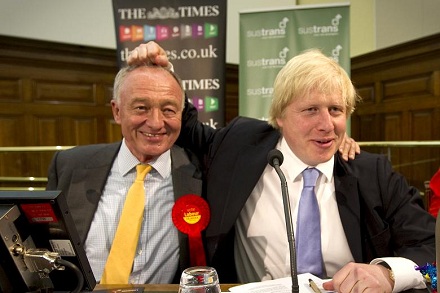At a time when the United Kingdom is falling back into double-dip recession and the Conservative Party is falling to a nearly double-digit gap in opinion polls against Labour Party (under the leadership of the rather inexperienced Ed Miliband, at that), why is Boris Johnson so seemingly poised to swamp today’s London mayoral election against former mayor Ken Livingstone? ![]()
Johnson has led, however narrowly, throughout the mayoral campaign, and in late April opened up a significant polling lead on Livingstone. Indeed, he seems to be widening his vote even as Livingstone tries to nationalize the election into a choice between Labour values and Conservative values (ironically, given his spotty history with the party).
You could probably count any number of reasons why this should not be the case. Johnson’s record as mayor is not incredibly accomplished. He’s presiding over a London that has watched its status as a global financial capital take quite a hit. And he’s just as much of a pampered old Etonian as the current Tory leadership of prime minister David Cameron and chancellor of the exchequer George Osborne, who are under fire nationally for their budget cuts program at a time when UK growth is slipping and unemployment is rising.
Livingstone, the first mayor of London, can point to significant success in his time in office from 2000 to 2008. He revamped London’s public transport system, even if his proposed congestion charge proved controversial. He led the way on registry of same-sex couples way back in 2001, long before the UK Civil Partnerships Act in 2004. Livingstone led the campaign to win the Summer Olympics to London, which will be held later this year. He also led the city with calm and dignity in the face of the July 2005 terrorist bombings, while giving voice to many of the anti-war concerns than neither mainstream Labour nor the Tories voiced over the war on terror.
A maverick willing to stand on principle against his own party, Livingstone even found himself kicked out of Tony Blair’s Labour Party for a while for having the audacity to win the 2000 mayoral election without Blair’s blessing (Blair grudgingly readmitted Livingstone after his landslide win in the 2004 mayoral election). There’s a strong case to be made that Livingstone offers better policies, while Boris offers only glib personality. Boris represents a party that now owns the UK’s sluggish economy, but voters trust him nearly 2-to-1 as better for London’s economy. Livingstone has pledged to cut transport costs by 7%, but Johnson still leads on transport issues.
So what gives?
There’s just something about Boris — with his shaggy-dog mop of hair and his boyish, slightly roguish charm, slightly reminiscent of former US president Bill Clinton perhaps, Johnson’s personality has indeed transcended policy in the mayoral election. He has allowed himself to become as much a mascot as mayor of London. Voters don’t seem to care about his tax dodginess, and they don’t care about his sometimes profane off-message statements (in fact, they may even cheer him for dropping a ‘fucking bollocks’ from time to time).
To say that there’s a bit of a personality gap between Boris and ‘Red Ken’ is an understatement, but don’t forget that Livingstone was one of the most outspoken politicians on the British left in the 2000s and is no shrinking daisy in his own right.
Indeed, you could argue that in distancing himself from the more austere (in both tone and in policy) Cameron and Osborne, Boris has stolen the London mayoral playbook right out of Livingstone’s hands, who was equally (or more) estranged from the Labour Party leadership of Blair and Gordon Brown.
If, as expected, Boris wins big in today’s mayoral election, it will confirm that he is the most charismatic politician today in the United Kingdom. Boris appeals to voters in a much more personal and engaging way than anyone else on the British political scene — has the blokeishness of Kenneth Clarke, the steely confidence of Margaret Thatcher and the smiling salesmanship of Tony Blair.
Which should terrify Labour and its somewhat underwhelming leader (just try to imagine a showdown between Boris and noodly neophyte Ed Miliband).
But it should also terrify the current Tory government even more, because if the Tory-Liberal Democrat coalition falls before its planned five-year duration (I think it’s still more likely than not), the Tories will have the option to dump Cameron and Osborne and disavow the ‘austerity era’ with a ready-made champion in Boris, who will have been otherwise engaged in London city politics, not the grim politics of budget-cutting in Westminster. Indeed, the danger of the charm and appeal of the Tories’ enfant terrible is one of the main reasons that Cameron, then just the Leader of the Opposition, so enthusiastically supported Boris’s campaign for London mayor, which, back in late 2007 seemed a fairly preposterous undertaking. So much the better for Cameron to have loose-cannon Boris out of Parliament and making merry mischief in London city government.
Furthermore, if Labour wins the next general election on the basis of Tory unpopularity, rather than any underlying enthusiasm for Labour or for Ed Miliband, Boris would certainly prove a much wilier opposition than the defeated Cameron or any of the current Tory leadership.
A William Hague leadership redux? Hardly, after the disasters of the 1997-2001 era.
Home secretary Theresa May, after turning loose the police on student protestors last year? Unlikely!
Similarly, you cannot imagine other key players on the Cameron frontbenches quite easily assuming leadership, either. Michael Gove? Liam Fox? Oliver Letwin? Eric Pickles? Ken Clarke will well be too old for leadership, David Davis too prickly and right-wing to win a general election.
Who else will there be?
Boris — provided he wins reelection today, and provided his next term as London mayor — when he’ll be the floppy-haired face of the 2012 Olympics — remains as charmed as his first.

3 thoughts on “There’s something about Boris”